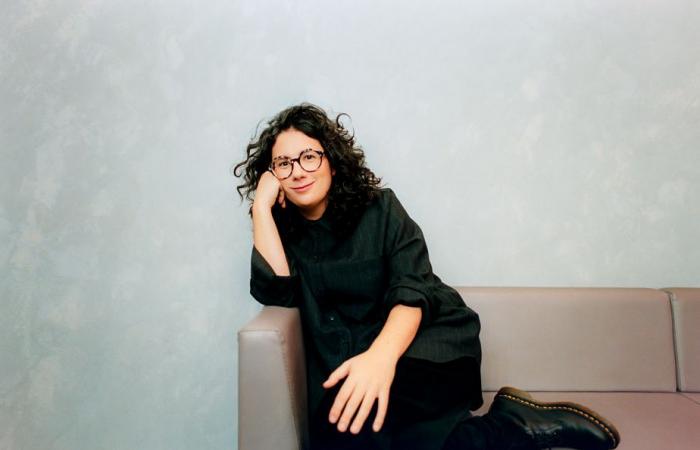Alexandra Stréliski wanted to meet Cœur de pirate because she is as much an artist as a businesswoman, two areas which interest her very much. We attended this conversation which took place on a cold January morning in the offices of Bravo Musique, of which Béatrice Martin is the boss.
Published at 7:00 a.m.
Money
Alexandra Stréliski : Do you think there is a taboo on the relationship between artists and money in society?
Béatrice Martin: Yes, and, in Quebec in general, with money. It’s not a good thing, you can’t talk about it.
AS : Just in Quebec?
BM : Um… yes. I’ve never seen this anywhere else. I don’t understand where this comes from.
The Press : Do we expect a lot of purity from artists?
AS : I think so. Art is pure. And commerce is not…
BM : But I did something very pure with my money! I invested in culture.
AS : Did you feel uncomfortable saying “I had enough money to buy my record company”?
BM : With some of my peers, yes. Industry peers. So far, I don’t think people really take me seriously. But that’s okay, I understand too, since I don’t have experience in that. The important thing is that my directors, my director, they are taken into consideration, they are on the ADISQ board, they are respected. I don’t care. I can be the owner. I sign the checks, it’s okay. [Rires]
Humans
AS : You receive a lot of testimonials because you address intimate themes in your songs. What is the most touching thing you have received?
BM : There are so many. I have accompanied people through illness, death, births. It makes them feel good to say it, and I get it. I accompany them without knowing them, but I am part of their lives. It was very much a driving force to continue. Like now, I’m working on a new album and I’m really stressed, I tell myself what’s the point… But when people tell me things, I remember why.
AS : Have you ever felt the need to have help relationship tools?
BM : At the beginning, it was more complicated. But now, if I can just listen to them…
AS : Are you able to listen to them with empathy, without being overwhelmed?
BM : Yes, but not when I was younger. Really, you can’t put things on a 19 year old girl who’s going about her own business. Today, I am able to understand the importance of these testimonies.
AS : Do you consider it part of your life and your duties?
BM : Of my duties! [Elle rit.]
AS : To listen to people. To receive them with empathy. It’s still interesting.
BM : I become a bit of a psychotherapist, a receptacle. But I can’t give advice!
Success
AS : Do you think popularity changes people’s perception of an artist?
BM : It’s your perception of your work and yourself that changes. So the pressure is greater. Me, I no longer know if what I’m doing is good. Sincerely.
AS : Would you say because of popularity? Or is it you as an artist?
BM : Before, when I was making albums, I was able to say, “OK, this is really good. » And there, I’m experiencing it at the moment, I couldn’t tell you if it’s good.
AS : But I constantly have this feeling. We live in perpetual doubt, right?
BM : There are people who have full confidence in their work. I find them fascinating.
AS : And they are successful?
BM : Yes, all the same!
AS : But I understand you. Like there, I finish my tour and I have nothing in front of me. I tell myself that my career is over. I just completed four Wilfrid-Pelletiers, I did the Plains, I can’t go any bigger. Thank you, goodbye, it was really a pleasure, I’m going to go make some pies! It is the artist’s characteristic to question himself. But I judge myself when I’m too successful, because I make art that’s supposed to be very niche.
BM : Do you think that Hans Zimmer, he said to himself “ah, it’s too big”?
AS : He doesn’t care! It’s true that it’s a self-judgment. I didn’t want to be seen in life, I don’t like it. But I go on stage in front of thousands of people and I say to myself: “But let’s see, what happened to me? »
BM : But that comes with the job! The day you choose to go on stage, you say goodbye to the part of you that wants to be in the shadows.
AS : You can do like me and move to the other side of the Atlantic!
BM : Exactly ! I live in NDG, no one knows who I am. [Rires.]
The creation
AS : Have you had imposter syndrome in your life?
BM : 100%. Less so now, I think, because I’ve come a long way. I have a great career, I’m still here. Life is going well. Afterwards, do people still want to listen to my music? That, I don’t know. But is it imposter syndrome or just anxiety talking?
AS : You said you were full of doubts while making this album. This one more than others?
BM : Yes. I’m not wondering why people like me. I have enough testimonies to know that I have my mark, that people have been touched by my music. Except it’s the past. The future… [Elle rit.]
AS : What makes us continue to create over time, do you think?
BM : Because it is linked to our existence. I stopped making music for two years after my son was born, because I was postpartum. That’s when I realized it went hand in hand. I was listening to my new songs earlier, I was sad because I couldn’t tell if it was good or not, but I basically knew that it had meaning. Sometimes we lack confidence, but I just want to say we have it.
The Press : Do you sometimes forget that you have it?
-BM : That’s it. For two years, I forgot about it. With the label too…
The Press : Exactly, now that you are the boss of a record company, what is the place of creation in all of this?
BM : It’s complicated. Alexandra and I live from our passion, and we never get tired of it. But then, imagine buying the business. [Elle se tourne vers Alexandra.] Do you still have yours?
AS : Yes, I bought a business.
The Press : What exactly?
AS : I bought shares in the studio where I worked when I was younger.
BM : I thought it was going to be creative and fun.
[Alexandra éclate de rire.]
AS : Your manager’s eyes on your back are worth 10,000 dollars!
BM : It’s true, I said “we’re going to sign artists, we’re going to brainstorm”… And now, I realize that no. Yes, in part, but it’s a lot of entrepreneurship, board meetings, managing human resources, and all that takes up a lot of energy. I set up a team, I took time off from day to day and everyone understands: I need to be able to concentrate on making my album, so that the company can continue! It’s a joke, it’s going really well, it’s just…
The Press : …Coeur de pirate is a locomotive for Bravo.
BM : That’s it! I am an artist who still generates profits. So the company depends on me, and I depend on it.
AS : Does being so interrelated with the commercial side of marketing your music harm your creation?
BM : At the beginning, you see what it brings in, you say to yourself “it has to work”. And a year without Coeur de pirate, it seems.
AS : OK, it’s next level. In addition, you have responsibility for turnover. I, too, am sure I have one for the people I work with, but I don’t see it. You see it quarter by quarter.
BM : I had a lot of anxiety about that. But we found a way to make it less stressful. Then in 2024, I haven’t done much as an artist, and the company is doing well.
AS : It’s only been four years [que Béatrice Martin a racheté Dare to Care Records pour en faire Bravo Musique]that takes time too.
BM : Yes. But for a long time, entrepreneurship ate away at my creative side, that’s for sure. I couldn’t think, help other artists, help myself. It’s important to sort things out.
The sequel
The Press : One thing you have in common is the piano. Has your relationship with your instrument changed over the years?
BM : I was never a really good pianist.
AS : But you did your Conservatory, right?
BM : Yes, but I was better when I was 14.
AS : Same thing for me. The piano is now a source of work, more than it ever was. I went to Brazil for three weeks, I didn’t touch a piano.
BM : Do you practice every day?
AS : I never practice.
BM : Oh ! Are you in any pain, like? I would be in pain.
AS : My manager doesn’t like it… But when it’s been a long time since I played, there’s a magic that takes hold, in the studio or in a show, and I like to capture that moment. But yes, the relationship has changed. Before, it was a diary.
The Press : Béatrice, these years when you didn’t compose much music… Did you play?
BM : I have to sing. And it’s a muscle. Besides, during the pandemic, I stopped singing and I injured myself. The piano hurts at some point if you don’t practice. A show lasting an hour and a half, phew!
AS : I’m getting tendinitis next week [avec sa série de concerts à la Place des Arts]that’s for sure.
The Press : What do you want to see from each other in the coming years?
BM : I think it will continue for Alexandra. The next the soundtrack Duneit’s you! [Rires.] I know you’ve done some before, but you can do even more film music!
AS : It could happen, yes.
BM : You go, girl. [Rires.]
AS : And I wish you…
BM : Wish me to find the next Pirate Heart, please. This way, I will finally be able to stop!
AS : No, on the contrary, I was going to say something along the lines of continuing to create. The purest, most “I don’t give a fuck” you can. That’s what I would wish for you. Less controlled in everything.
BM : This is what’s coming, and that’s why I don’t know if it’s good!
AS : I think it’s a good sign.
The remarks in this conversation have been abbreviated and condensed for brevity.






